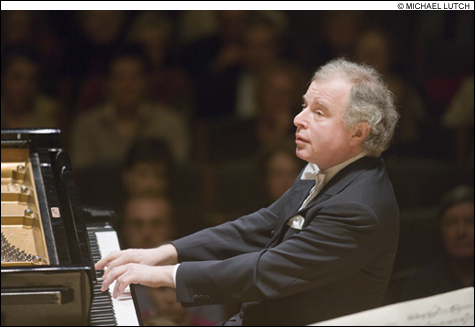
QUIET SPIRITUALITY? As performed by András Schiff and Bernard Haitink, the slow movement of
Bartók’s Third Piano Concerto had more of it than Haitink’s entire St. Matthew Passion. |
If the St. John Passion is Bach’s equivalent of lesser Shakespeare, the St. Matthew Passion is Bach’s King Lear. In the wake of the moving St. John that Michael Beattie had led with Emmanuel Music the week before, I was especially eager to hear the St. Matthew with the Boston Symphony Orchestra under its conductor emeritus, Bernard Haitink, who at 79 was leading it for the very first time. The results were mixed.
There was some excellent work. Celebrated British tenor Ian Bostridge was a worldly rather than otherworldly Evangelist. Some people find him mannered (he has the gangly slimness of the effete Pre-Raphaelite poet Bunthorne in Gilbert & Sullivan’s Patience), but he also seemed committed, caring, despairing, even outraged. Australian tenor Steve Davislim (in his BSO debut) sang with accuracy and intensity. The obbligato accompaniments — which included stellar, imaginative playing by guest Laura Jeppesen on the viola da gamba — were beautiful and expressive. And a handful of outstanding Boston singers really familiar with this music — baritone David Kravitz (the angry young Jesus in the Cantata Singers’ 2004 St. Matthew, powerful here as both Peter and Pilate), bass Mark Andrew Cleveland (an affecting Judas), and (wasted in even smaller roles) soprano Kendra Colton, mezzo Paula Murrihy, and tenor William Hite (the Cantata Singers’ Evangelist) — put most of the visiting vocalists to shame.
As a whole, though, this St. Matthew was an anemic three-and-a-quarter-hour exercise in which Haitink appeared to be trying to balance old-fashioned full-throated Bach with leaner, historically informed early-music practice. In the end he offered neither insightful moment-to-moment phrasing nor larger spiritual illumination, capturing little of Bach’s drama, tension, or passion.
The St. Matthew Jesus needs to seem to be holding back, but German baritone Thomas E. Bauer was understated without suggesting reserves of power. The alto soloist sings one of Bach’s most profound prayers for mercy, “Erbarme dich,” which requires a true contralto (or countertenor) with a bottomless range that embodies the Earth itself, pleading for all humanity. It seemed perverse to cast in this role the affectless mezzo-soprano Christianne Stotijn (evidently a favorite of her Dutch compatriot Haitink), who sang with no conviction and whose thin sound had no lower register at all. (She was a little better in duet with the perky soprano Marlis Petersen.) The bass has the final aria, “Mache dich, mein Herze, rein” (“Make yourself pure, my heart”), the “lesson” of the Passion to which all the preceding music leads: “I myself will be Jesus’s tomb — he will rest in me.” Haitink rather rushed British bass Peter Harvey through this. Lacking either vocal or emotional penetration, Harvey could have been delivering a weather report.
The PALS Children’s Chorus was fine, sounding more like children than angels. The Tanglewood Festival Chorus was best in dramatic outbursts of crowd anger and in some of the quiet hymns. In the opening section, the chorus interrupts with urgent questions: “Who?” “How?” “What?” “Where?” Here the questions were more “delicate” than urgent. Haitink so underplayed Bach’s stirring contrasts between public rage and inner contemplation that he undermined the effectiveness of the chorus.